The Mummy Read online
Page 5
"Not too rough, sir," she whispered.
"Why not?"
The telephone rang. She could have ripped it from the wall.
She unbuttoned his shirt for him as he answered.
"I told you not to call again, Sharpies."
Oh, that bloody son of a bitch, she thought miserably. She wished he was dead. She'd worked for Sharpies before Henry Stratford had rescued her. And Sharpies was a mean one, plain and simple. He had left his scar on her, a tiny half-moon on the back of her neck.
"I told you I'd pay you when I got back, didn't I? Suppose you give me time to unpack my trunk!" He jammed down the little cone of a receiver into the hook. She pushed the phone back out of the way on the marble-top table.
"Come here to me, sweetheart," she said as she sat on the bed.
But her eyes dulled slightly as she watched him staring at the telephone. He was broke still, wasn't he? Stone broke.
Strange. There had been no wake in this house for her father. And now the painted coffin of Ramses the Great was being carried carefully through the double drawing rooms as if by pallbearers, and into the library, which he had always called the Egyptian room. A wake for the mummy; and the chief mourner was not here.
Julie watched as Samir directed the men from the museum to place the coffin carefully upright in the southeast corner, to the left of the open conservatory doors. A perfect position. Anyone entering the house could see it immediately. All those in the drawing rooms would have a good view of it; and the mummy himself would appear to have a view of all assembled to pay him homage when the lid was lifted and the body itself was revealed. The scrolls and alabaster jars would be arranged on the long marble table beneath the mirror to the left of the upright coffin, along the east wall. The bust of Cleopatra was already being placed on a stand in the center of the room. The gold coins would go in a special display case beside the marble table. And other miscellaneous treasures could now be arranged any way that Samir saw fit.
The soft afternoon sunlight poured in from the conservatory, throwing its intricate dancing patterns over the golden mask of the King's face and his folded arms.
Gorgeous it was, authentic obviously. Only a fool would question such a treasure. But what did the whole story mean?
Oh, if only they were all gone, Julie thought, and she could be alone now to study it. But the men would be here forever examining the exhibit. And Alex, what to do about Alex, who stood beside her, and gave her not a moment to herself?
Of course she'd been glad to see Samir, though it had stirred her own pain to see the pain in him.
And he looked stiff and uncomfortable in his black Western suit and starched white shirt. In the silks of his native dress, he was a dark-eyed prince, quite removed from the dreary routines of this noisy century and its bludgeoning drive to progress. Here he looked foreign, and almost servile in spite of the imperious manner in which he ordered the workmen about.
Alex stared at the workmen and their relics with the strangest expression. What was it? These things meant nothing to him; they had to do with some other world. But did he not find them beautiful? Ah, it was so difficult for her to understand. ' 'I wonder if there is a curse,'' he whispered softly. "Oh, please, don't be ridiculous," Julie answered. "Now, they're going to be working for some time. Why don't we go on • back into the conservatory and have tea?"
"Yes, we should do that," he said. It was dislike in his face, wasn't it? Not confusion. He felt nothing for these treasures. They were alien to him; they did not matter one way or the other. She might have felt the same way gazing at a modern machine she did not understand.
It saddened her. But everything saddened her now-and most of all the fact that her father had had so little time with these many treasures, that he had died on the very day of his greatest discovery. And that she was the one who must savour each and every article that he had uncovered in this mysterious and controversial grave.
Perhaps after tea, Alex would understand that she wanted to be alone. She led him down the hall now, past the double doors of me drawing rooms, past the doors of the library and out through the marble alcove into the glass room of ferns and flowers that ran across the entire back of the house.
This had been Father's favourite place when he was not in the library. No accident that his desk and his books were only a few feet away, through those glass doors.
They sat down at the wicker table together, the sun playing beautifully on the silver tea service before them.
"You pour, dearest," she said to Alex. She laid out the cakes on the plates. Now that gave him something to do which he understood.
Had she ever known a human being who could do all the little things so well? Alex could ride, dance, shoot, pour tea, mix delicious American cocktails, slip into the protocol of Buckingham Palace without batting an eyelash. He could read an occasional poem with such a simulation of feeling that it made her weep. He could kiss very well, too, and there was no doubt that marriage with him would have its deeply sensuous moments. No doubt whatsoever. But what else would it have?
She felt selfish suddenly. Wasn't all that enough? It hadn't been for her father, a merchant prince whose manners were indistinguishable from those of aristocratic friends. It had meant nothing at all.
"Drink it, darling, you need it," Alex said to her, offering her the cup the way she liked it. No milk, no sugar. Only a thin slice of lemon.
Imagine anyone really needing tea.
It seemed the light changed around her; a shadow. She looked up to see that Samir had come silently into the room.
"Samir. Sit down. Join us."
He motioned for her to remain where she was. He was holding a leather-bound book in his hands.
"Julie," he said with a slow and deliberate glance in the direction of the Egyptian room, "I brought your father's notebook to you. I didn't want to give it to the people at the museum."
"Oh, I'm so glad. Do join us, please."
"No, I must return to work immediately. I want to make sure things are done as they should be. And you must read this notebook, Julie. The newspapers, they published only the bare bones of this story. There is more here. ..."
"Come, sit down," she pressed again. "We'll take care of that together, later."
After a moment's hesitation, he gave in. He took the chair beside her, giving a little polite nod to Alex, to whom he'd been introduced before.
"Julie, your father had only begun his translations. You know his command of the ancient tongues. . . ."
"Yes, I'm eager to read it. But what is really troubling you?" she said earnestly. "What is wrong?"
Samir pondered, then: "Julie, I am uneasy about this discovery. I am uneasy about the mummy and the poisons contained in the tomb."
"Were they really Cleopatra's poisons?" Alex said quickly. "Or is that something the reporters dreamed up?"
"No one can say," Samir answered politely.
"Samir, everything is carefully labeled," Julie said. "The servants had been told."
"You don't believe in the curse now, do you?" Alex asked.
Samir made a little polite smile. "No. Nevertheless," he said, turning back to Julie. "Promise me that if you see anything strange, even if you suffer a presentiment, you will call me at the museum at once.''
"But, Samir, I never expected you to believe-"
"Julie, curses are rare in Egypt," he said quickly. "And the admonitions written on this mummy case are most severe. The story of the creature's immortality, there are more details in this little book,"
"But you don't think Father really succumbed to a curse, Samir."
"No. But the things found in the tomb defy explanation. Except if one believes ... But then that is absurd. I ask only that you take nothing for granted. That you call me if you need me at once."
He took his leave of her abruptly, and went back into the library. She could hear him speaking Arabic to one of the workmen. She watched them uneasily through the open doors.
Grief, she thought. It's a strange and a misunderstood emotion. He grieves for Father as I do, and so the whole discovery is ruined for him. How difficult all this must be.
And he would have so enjoyed all of it if only . . . Well, she understood. It was not so with her. She wanted nothing so much as to be alone with Ramses the Great and his Cleopatra. But she understood. And the pain of Father's loss would be there forever. She didn't really want it to go away. She looked at Alex, poor lost boy staring at her with such concern.
"I love you," he whispered suddenly.
"Why, what on earth has come over you!" She laughed softly.
He looked baffled, childlike. Her handsome fiance was really suffering suddenly. She couldn't bear it.
"I don't know," he said. "Maybe I'm having a presentiment. Is that what he called it? I only know I want to remind you-I love you."
"Oh, Alex, dear Alex." She bent forward and kissed him, and felt his sudden desperate clasp of her hand.
The gaudy little clock on Daisy's dressing table rang six.
Henry sat back, stretched, then reached for the champagne again, filling his glass, then hers.
She looked drowsy still, the thin satin strap of her nightgown fallen down over one rounded arm.
"Drink, darling," he said.
"Not me, lovey. Singing tonight," she said with an arrogant lift of her chin. "I can't drink all day like some I know." She tore off a bit of meat from the roasted fowl on her plate, and put it in her mouth crudely. Beautiful mouth. "But this cousin of yours! She's not afraid of the bloody mummy! Putting it right there in her own house!"
Big stupid blue eyes fixed on him; just the kind he liked. Though he missed Malenka, his Egyptian beauty; he really did. The thing about an Eastern woman was she didn't have to be stupid; she could be clever, and just as easy to manage. With a girl like Daisy, the stupidity was essential; and then you had to talk to her-and talk to her and talk to her.
"Why the hell should she be afraid of the damned mummy!" he said irritably. "The daft part is giving the whole treasure to a museum. She doesn't know what money is, my cousin. She has too much of it to know. He increased my trust fund by a pittance and he leaves her a shipping empire. He's the one who was ..."
He stopped. The little chamber; the sunlight falling in shafts on that thing. He saw it again. Saw what he had done! No. Not right. Died of a heart attack or a stroke, he did-the man lying sprawled on the sandy floor, I didn't do it. And that thing, it hadn't been staring through the wrappings, that was absurd!
He drank the champagne too quickly. Ah, but it was good, He filled his glass again.
"But a bleeding mummy in the very house with her," Daisy said.
And suddenly, violently, he saw those eyes again, beneath rotted bandages, staring at him. Yes, staring. Stop it, you fool, you did what you had to do! Stop it or you will go mad.
He rose from the table a bit clumsily and put on his jacket, and straightened his silk tie.
"But where are you going?" Daisy asked. "You're a bit too drunk to be going out now, if you ask me."
"But I didn't," he answered. She knew where he was going. He had the hundred pounds he'd managed to squeeze out of Randolph, and the casino was open. It had opened at dark.
He wanted to be there alone now, so that he could truly concentrate. Merely thinking of it, of the green baize under the lamps and the sound of the dice and roulette wheel, engendered a deep excitement in him. One good win, and he'd quit, he promised himself. And with a hundred pounds to start. No, he couldn't wait. . . .
Of course he'd run into Sharpies, and he owed Sharpies too much money, but how the hell was he supposed to pay it back if he didn't get to the tables, and though he didn't feel lucky-no, not lucky at all tonight-well, he had to give it a try.
"Just wait now, sir. Sit down, sir," Daisy said, coming after him. "Have another glass with me and then a little nap. It's barely six o'clock."
"Let me alone," he said. He put on his greatcoat and pulled on his leather gloves. Sharpies. A stupid man, Sharpies. He felt in his coat pocket for the knife he'd carried for years. Yes, still there. He drew it out now, and examined the thin steel blade. "Oh no, sir," Daisy gasped.
"Don't be a fool," he said offhandedly, and closing the knife and putting it back into his pocket he went out the door.
No sound now but the low gurgling of the fountain in the conservatory, the ashen twilight long gone, the Egyptian room lighted only by the green shaded lamp on Lawrence's desk.
Julie sat in her father's leather chair, back to the wall, her silk peignoir soft and comfortable, and surprisingly warm, her hand on the diary which she had not yet read.
The glittering mask of Ramses the Great was ever so slightly frightening, the large almond-shaped eyes peering into the soft shadows; the marble Cleopatra appeared to glow. And so beautiful the coins mounted on black velvet against the far wall.
She had inspected them carefully earlier. Same profile as the bust, same rippling hair beneath its gold tiara. A Greek Cleopatra, not the silly Egyptian image so popular in programmes for Shakespeare's tragedy, or in the engravings which illustrated Plutarch's Lives and popular histories galore.
Profile of a beautiful woman; strong, not tragic. Strong as Romans loved their heroes and heroines to be strong.
The thick scrolls of parchment and papyrus looked all too fragile as they lay heaped on the marble table. The other items could also be easily destroyed by prying hands. Quill pens, ink pots, a little silver burner meant for oil, it seemed, with a ring in which to position a glass vial. The vials themselves lay beside it-exquisite specimens of early glasswork, each with a tiny silver cap. Of course all these little relics, and the string of alabaster jars behind them, were protected by small, neatly inscribed signs which read: "Please do not touch."
Nevertheless, it worried her, so many coming here to view these things.
"Remember, it's poison, most definitely," Julie had told Rita and Oscar, her indispensable maid and butler. And that had been enough to keep them out of the room!
"It's a body, miss," Rita had said. "A dead body! Never mind it's an Egyptian King. I say leave the dead alone, miss."
Julie had laughed softly to herself. "The British Museum is full of dead bodies, Rita."
If only the dead could come back. If only the ghost of her father would come to her. Imagine such a miracle. Having him again, speaking to him, hearing his voice. What happened, Father? Did you suffer? Was there even one second when you were afraid?
Yes, she wouldn't have minded such a visitation at all. But no such thing would ever happen. That was the horror. We went from the cradle to the grave beset by mundane tragedies. The splendour of the supernatural was a thing for stories and poems, and Shakespeare's plays.
But why dwell on it? Now had come the moment to be alone with her father's treasures, and to read the last words he wrote.
She turned the pages now to the date of the discovery. And the first words she saw made her eyes fill with tears.
Must write to Julie, describe everything. Hieroglyphs on the door virtually free of error; must have been written by one who knew what he was writing. Yet the Greek is entirely of the Ptolemaic period. And the Latin is sophisticated. Impossible, Yet there it is. Samir uncommonly fearful and superstitious. Must sleep for a few hours. Am going in tonight!
There was a hasty ink sketch of the door of the tomb and its three broad paragraphs of writing. Hastily she turned to the next page.
Nine P.M. by my watch. Inside the chamber at last. Appears to be a library rather than a tomb. The man has been laid to rest in a King's coffin beside a desk on which he has left some thirteen scrolls. He writes entirely in Latin, with obvious haste but no carelessness. There are droplets of ink all over, but the text is completely coherent.
"Call me Ramses the Damned. For that is the name I have given myself. But I was once Ramses the Great of Upper and Lower Egypt, slayer of the Hittites, Father of many sons and daughters, who ruled Egypt for si
xty-four years. My monuments are still standing; the stele recount my victories, though a thousand years have passed since I was pulled, a mortal child, from the womb.
"Ah, fatal moment now buried by time, when from a Hittite priestess I took the cursed elixir. Her warnings I would not heed. Immortality I craved. And so I drank the potion in the brimming cup. And now, long centuries gone by-amid the poisons of my lost Queen, I hide the potion which she would not accept from me-my doomed Cleopatra."
Julie stopped. The elixir, hidden amongst these poisons? She realized what Samir had meant. The papers had not told that part of the little mystery. Tantalizing. These poisons hide a formula that can grant eternal life.

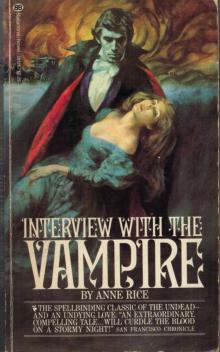 Interview with the Vampire
Interview with the Vampire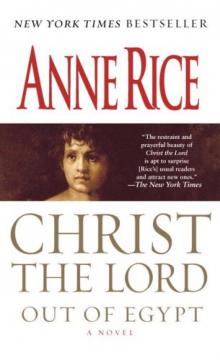 Christ the Lord: Out of Egypt
Christ the Lord: Out of Egypt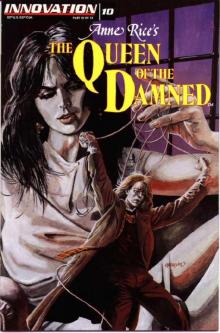 The Queen Of The Damned
The Queen Of The Damned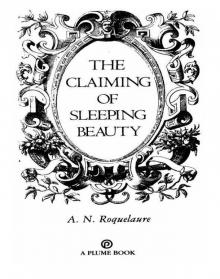 The Claiming of Sleeping Beauty
The Claiming of Sleeping Beauty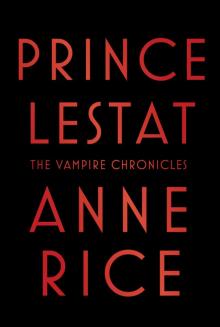 Prince Lestat
Prince Lestat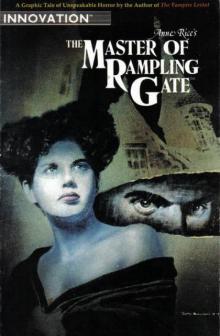 The Master of Rampling Gate
The Master of Rampling Gate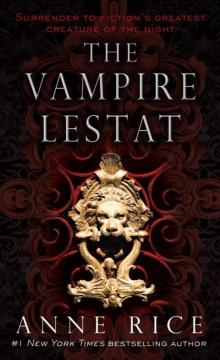 The Vampire Lestat
The Vampire Lestat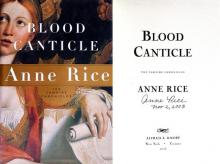 Blood Canticle
Blood Canticle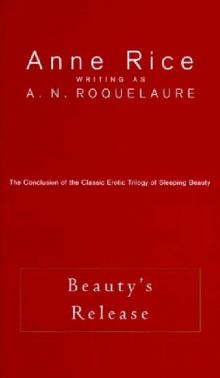 Beauty's Release
Beauty's Release Pandora
Pandora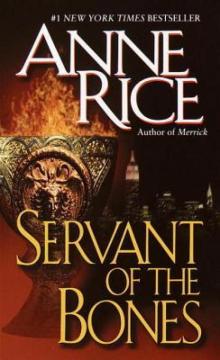 Servant of the Bones
Servant of the Bones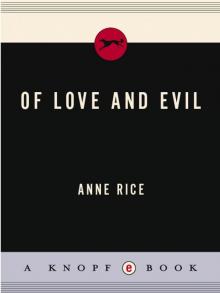 Of Love and Evil
Of Love and Evil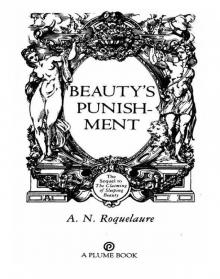 Beauty's Punishment
Beauty's Punishment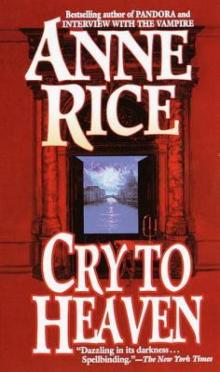 Cry to Heaven
Cry to Heaven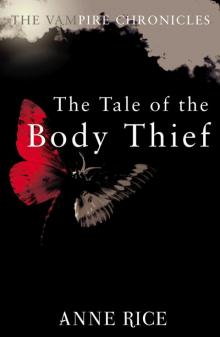 The Tale of the Body Thief
The Tale of the Body Thief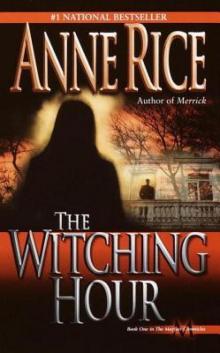 The Witching Hour
The Witching Hour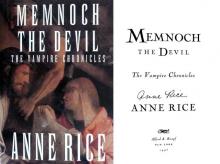 Memnoch the Devil
Memnoch the Devil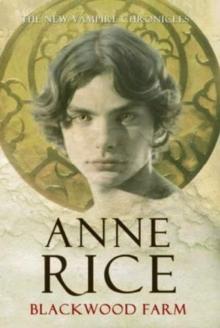 Blackwood Farm
Blackwood Farm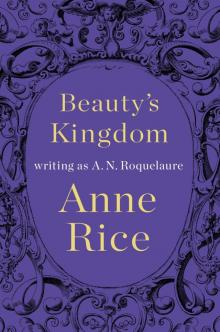 Beauty's Kingdom
Beauty's Kingdom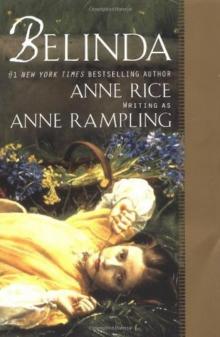 Belinda
Belinda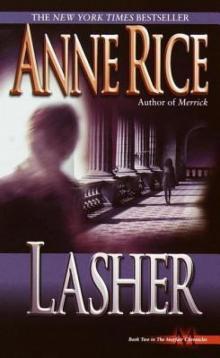 Lasher
Lasher Vittorio, the Vampire
Vittorio, the Vampire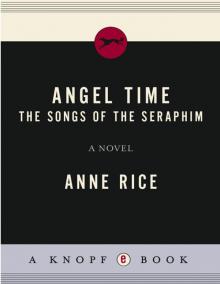 Angel Time
Angel Time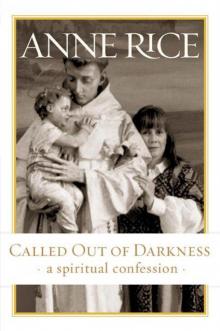 Called Out of Darkness: A Spiritual Confession
Called Out of Darkness: A Spiritual Confession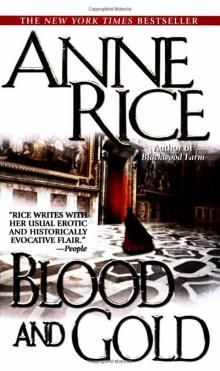 Blood And Gold
Blood And Gold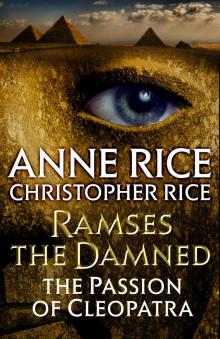 The Passion of Cleopatra
The Passion of Cleopatra Taltos
Taltos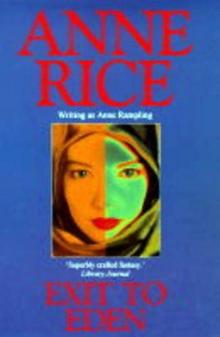 Exit to Eden
Exit to Eden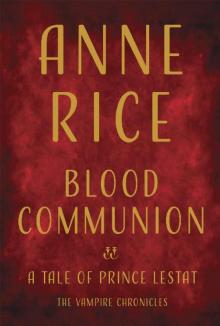 Blood Communion (The Vampire Chronicles #13)
Blood Communion (The Vampire Chronicles #13) The Wolf Gift
The Wolf Gift The Wolves of Midwinter
The Wolves of Midwinter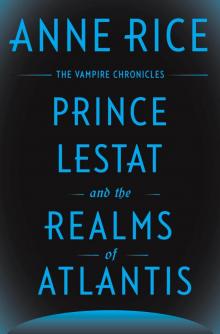 Prince Lestat and the Realms of Atlantis
Prince Lestat and the Realms of Atlantis The Ultimate Undead
The Ultimate Undead The Vampire Lestat tvc-2
The Vampire Lestat tvc-2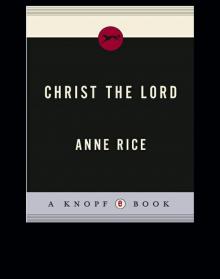 The Road to Cana
The Road to Cana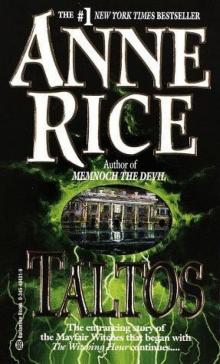 Taltos lotmw-3
Taltos lotmw-3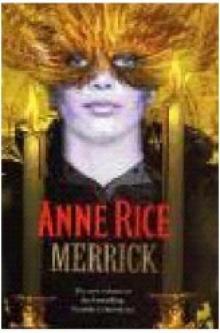 Merrick tvc-7
Merrick tvc-7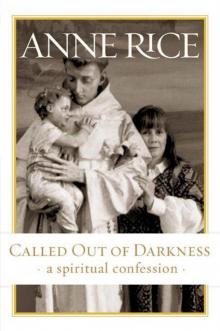 Called Out of Darkness
Called Out of Darkness Pandora - New Vampires 01
Pandora - New Vampires 01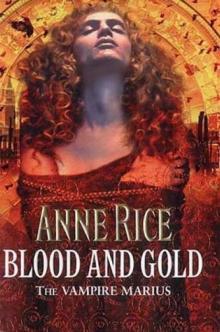 Bllod and Gold
Bllod and Gold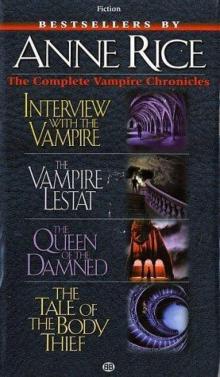 The Queen Of the Damned: Vampire Chronicles
The Queen Of the Damned: Vampire Chronicles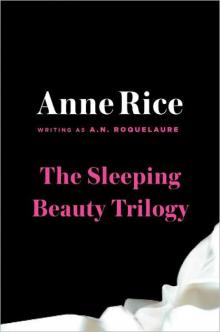 The Sleeping Beauty Trilogy
The Sleeping Beauty Trilogy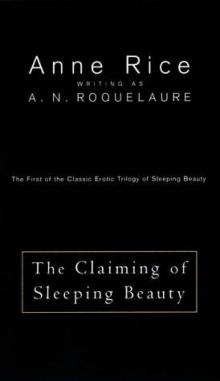 The Claiming of Sleeping Beauty b-1
The Claiming of Sleeping Beauty b-1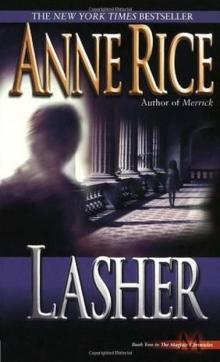 Lasher lotmw-2
Lasher lotmw-2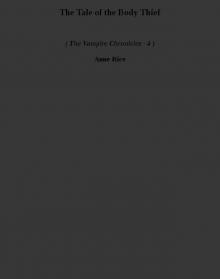 The Tale of the Body Thief tvc-4
The Tale of the Body Thief tvc-4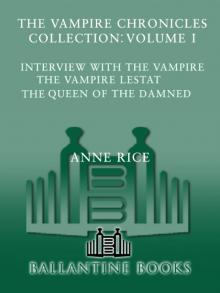 The Vampire Chronicles Collection
The Vampire Chronicles Collection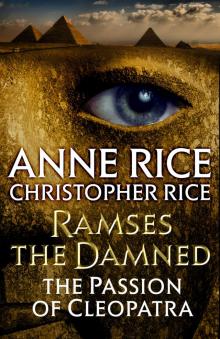 Ramses the Damned
Ramses the Damned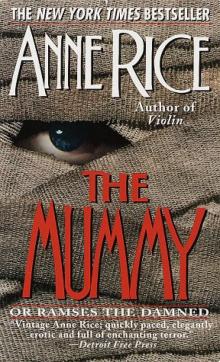 The Mummy - or Ramses the Damned
The Mummy - or Ramses the Damned Vittorio, The Vampire - New Vampires 02
Vittorio, The Vampire - New Vampires 02 The Vampire Armand tvc-6
The Vampire Armand tvc-6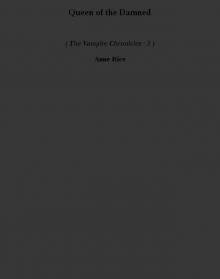 Queen of the Damned tvc-3
Queen of the Damned tvc-3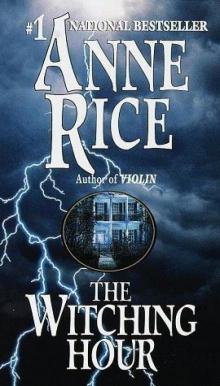 The witching hour lotmw-1
The witching hour lotmw-1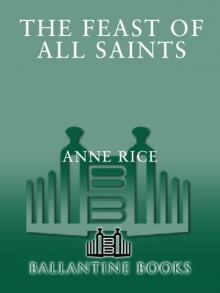 Feast of All Saints
Feast of All Saints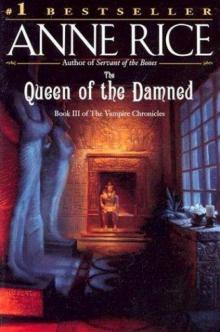 Queen of the Damned
Queen of the Damned The Wolves of Midwinter twgc-2
The Wolves of Midwinter twgc-2 The Mummy
The Mummy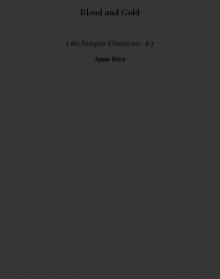 Blood and Gold tvc-8
Blood and Gold tvc-8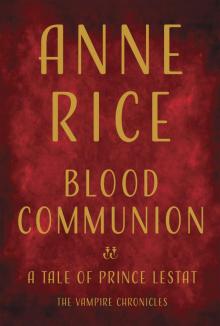 Blood Communion
Blood Communion Interview with the Vampire tvc-1
Interview with the Vampire tvc-1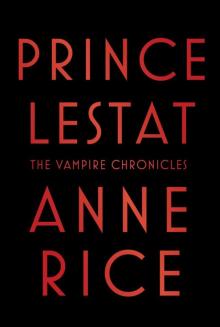 Prince Lestat: The Vampire Chronicles
Prince Lestat: The Vampire Chronicles